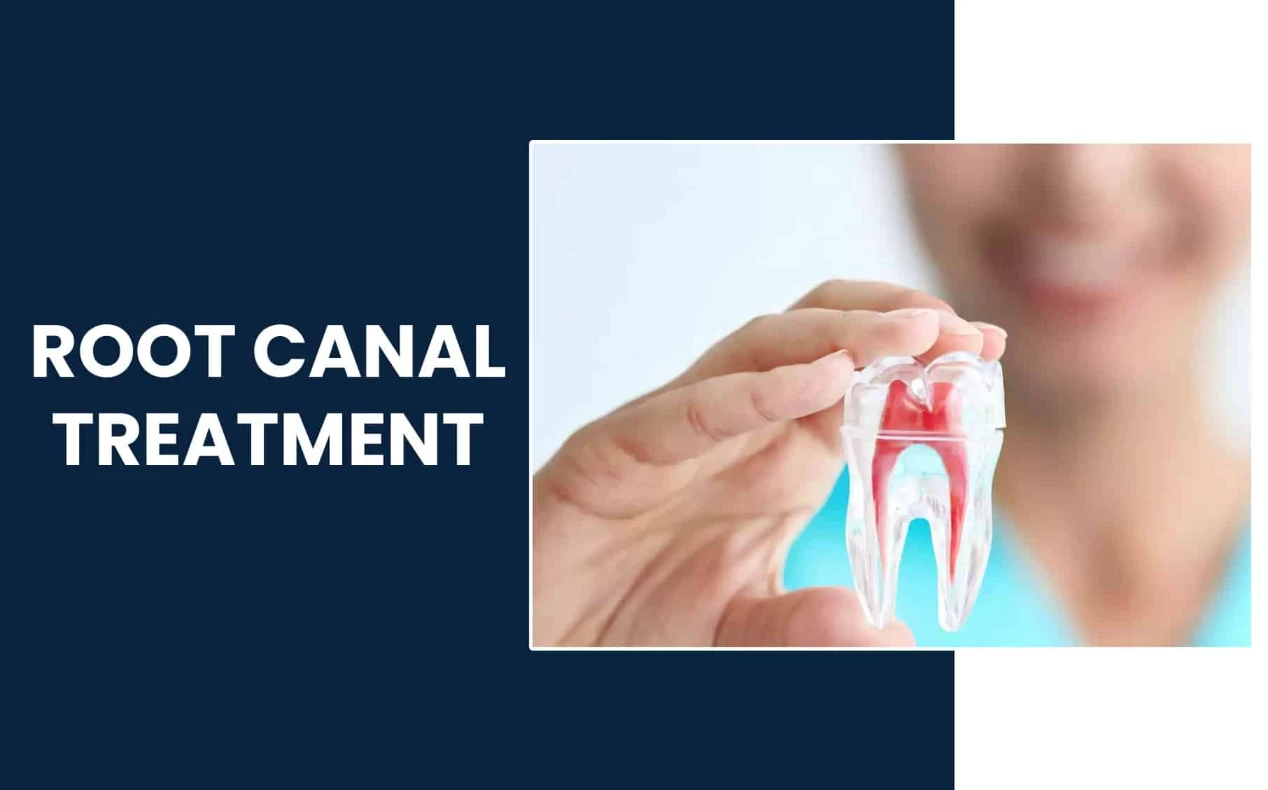Root Canal Treatment

Best Root Canal Specialist In Tucson
Research shows that almost everyone experiences a toothache from time to time. They vary in severity and can be caused by a wide range of factors.
Some are temporary whereas others could last indefinitely without dental treatment. When it comes to those in the latter category, all you can think of is getting rid of the constant pain that seems to radiate through not only the tooth itself but the jawbone, eye socket, neck, and other areas.
While eliminating the pain is certainly a top priority, treating its source is even more important. Otherwise, the pain will only keep returning and getting worse with each relapse.
Though most people aim for having the problematic tooth pulled, that’s not necessarily the only option. A root canal treatment can provide an effective solution while also saving the tooth.
At our clinic in Tucson, we provide safe and painless root canal treatments to stop infection early, restoring comfort and protecting your natural tooth. We have been serving local families for years and have built a reputation for reliable dental care. With advanced technology and experienced root canal specialists, we ensure the procedure is both comfortable and affordable for you.
Meet Your Tucson Dentist
Dr. Brock Boudreaux, (pronounced “Boo-drow”) attended Utah Valley University for his undergraduate degree. After which he traveled across the country to Kentucky where he received his Doctor of Dental Medicine degree from the University of Louisville School of Dentistry. Though he is a Louisville Cardinal for life, he is finding it very easy to become a Wildcat fan!
Let’s Get Your Smile
Taken Care Of
Do you have a question or would you like to schedule a visit? Contact our team, and we will assist you right away. We are here to offer thoughtful guidance and a smooth start to your care.
Our Professional Root Canal Treatment Services
Our skilled endodontists are experienced in all types of endodontic therapies. We focus on providing an effective cure to stop infection, alleviate pain, and save your tooth.
Non-Surgical Root Canal Therapy
When infection affects the pulp of your tooth, we perform a non-surgical root canal to clean and seal the canal system. Using CBCT imaging and rotary endodontic instruments, our dentist removes the infected pulp, disinfects the canal, and fills it with biocompatible material to prevent future infection. A custom dental crown may be placed afterward to restore full strength and function.
This service is ideal for deep cavities, cracked teeth, or inflamed pulp, and it’s performed under local anesthesia for a relaxed experience.
Surgical Root Canal Therapy
If infection extends beyond the root tip or into surrounding bone, surgical intervention may be required. Our endodontic specialist carefully accesses the root tip through a small opening in the gum, removes the infected tissue, and seals the canal end.
The area is then sutured to promote healing. If you experience anxiety, you can choose light sedation for additional comfort. With precise techniques and thorough aftercare, this option helps preserve natural teeth that might otherwise require extraction.
Root Canal Retreatment
Sometimes a tooth does not heal properly after a previous root canal or becomes infected again. In these cases, we perform root canal retreatment. The dentist removes the old filling material, re-cleans the canal, disinfects it, and reseals it to restore health and function.
This approach saves the natural tooth and prevents further complications, something our patients appreciate when facing recurrent dental infections.
Why Would I Need a Root Canal?
Root canals are typically needed when the pulp inside the tooth becomes inflamed. Pulp inflammation can be caused by tooth decay, bacterial infections, cracked or broken teeth, and tooth injuries.
Having repeated dental procedures performed on a tooth can also damage the pulp and lead to the need for a root canal treatment.
What Is a Root Canal Procedure?
A root canal procedure is a dental treatment during which a dentist removes infected or inflamed soft tissue inside a tooth. Known as the pulp, this tissue consists of nerves, blood vessels, and soft connective materials. When it becomes inflamed, it needs to be treated by a root canal dentist.
Teeth are made of hard materials, like enamel and dentin. Those materials don’t contain nerves, so the teeth themselves don’t cause pain.
It’s the pulp inside the tooth that sends pain impulses when it’s inflamed or infected. Removing this soft tissue rather than the tooth during an endodontist procedure can solve the problem.
Holistic and Biological Root Canal Options
In our clinic, we use advanced dental procedures to treat infected or painful teeth. Our approach combines both biological and holistic dentistry, focusing not only on treating your tooth but also supporting your overall health.
After a careful evaluation, our biological dentist treats the problematic tooth with ozone therapy, laser technology, and biocompatible materials. In some cases, we recommend endodontic therapy using advanced techniques or holistic root canal removal as a healthier and long-term solution.
Signs that You May Need a Root Canal Surgery
Severe and prolonged tooth pain is the most obvious sign that you might need an endodontist. Pain is your body’s way of telling you that something is wrong and needs to be fixed. Pain that arises or worsens while you’re chewing food or placing pressure on the tooth may also be a warning sign. Ongoing tooth sensitivity to heat and cold is an indication as well.
You may also experience gum swelling or tenderness around the affected tooth. At the same time, you could develop an abscess in the gums. An abscess is a pocket of infection.
It may lead to swelling that’s noticeable from the outside or cause a tender, painful lump to form in your neck or jaw depending on where the infection lies. All those symptoms may be accompanied by a fever or heat in the affected area.
What Happens During a Root Canal Treatment?
You’ll need to visit a root canal dentist to determine whether a root canal would be an effective option for you. During this consultation, the dentist will examine the affected tooth to find out why it’s causing you pain. If he or she decides that a root canal is the best option, you’ll proceed from there.
Your dentist may not perform the best endodontist immediately. Instead, you may need to schedule an appointment to have the procedure carried out at a later date.
In the meantime, the dentist may prescribe antibiotics to clear up any infection that’s present or painkillers to help ease the discomfort.
Before the Procedure Begins
When you arrive at the dentist’s office for the root canal procedure, you’ll be taken to an exam room and fitted with a paper bib just like you would at any other type of dental visit. Then, the dentist will apply a numbing agent to your gums.
Next, the dentist will inject a local anesthetic into your gums and at the hinge of the jawbones. It’s the same as if you were having a tooth extracted.
The Root Canal Procedure
Once your mouth is fully numb, the dentist will drill a small hole in the affected tooth so he or she can get to the soft tissue inside.
Then, the dentist will gently remove the pulp using special tools. All the soft tissue inside the tooth will be removed to ensure nothing remains to become infected and cause further pain.
After all, the pulp is removed and the interior of the tooth is clean, the dentist may apply a topical antibiotic to help clear up any remaining infection.
He or she will also fill in the tooth with a flexible material called gutta-percha. This material is held in place by dental cement.
It’s designed to seal off the tooth and prevent food and bacteria from getting inside it. A temporary filling may also be put into place if needed.
Follow-up Care and Treatment
If necessary, the dentist will prescribe oral antibiotics after the procedure to further treat any infection. You’ll need to schedule a follow-up appointment as well.
During that visit, the dentist will remove the temporary filling if one was applied. He or she will also perform any necessary procedures to further repair the tooth if it’s chipped, cracked, or broken.
Is a Root Canal Painful?
No, a root canal treatment isn’t painful. Local anesthetics prevent you from feeling pain during the procedure. As is the case with extractions, you may feel pressure during the procedure and minimal aching or discomfort after the numbing agent and anesthetic wear off.
The discomfort will only last a few hours to a few days, though. Keep in mind, any discomfort you feel after the fact isn’t remotely as bad as the pain the tooth caused before the procedure.
How Long Does a Root Canal Take?
Root canals usually take about 30 minutes to an hour to complete. In some instances, they can take a little longer.
Are You Awake During a Root Canal?
Yes, patients are awake during root canals. Dentists administer local anesthetics for the procedure, though, so you won’t feel any pain.
Find Out if a Root Canal Is Right for You
Root canal treatments aren’t right for every situation. In some cases, the tooth may be too damaged to restore. If so, an extraction will be necessary. That being said, RCT treatments are often a viable solution.
Read : Why Would I need a Root Canal?
Call us or contact us using the form we’ve provided to schedule a consultation and find out if a root canal treatment in Tucson is the answer to your tooth pain.
Frequently Asked Question
How long does it take to recover from a root canal?
It will take you a few days to fully recover from an endodontic treatment.
Does a root-end procedure hurt?
It does not hurt because the dentist performs it under local anesthesia. However, you may feel a little discomfort and swelling after the procedure.
How do I know that I need an endodontic surgery?
Severe toothache, extreme sensitivity, and swollen gums are the most common signs that you need root-end treatment.
Which tooth is most difficult to get a root-end surgery on?
The molar root canal is the most difficult to perform because of its location and the size of the root.
What are the signs of a failed surgical endodontics?
Common signs of the failed root-end surgery include constant pain, tooth sensitivity or discolouration, swelling in the gums, and bad breath.
Do you offer same-day root canals in Tucson?
Yes, our experienced endodontist completes this dental procedure in one visit using modern technology. However, complex cases may need more than one visit.


